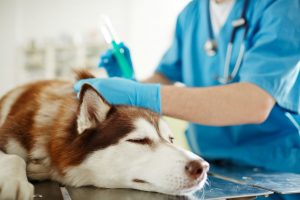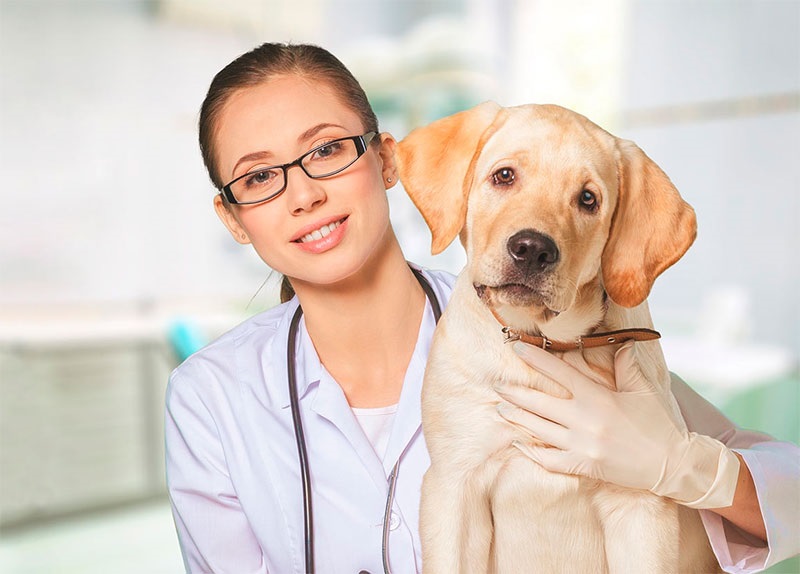Dog Vet
 Dogs are one of the most beloved pets. Unfortunately, these animals are prone to diseases just like humans. The causes of disease are most often malnutrition, improper care and maintenance, injuries, lack of vaccinations, parasite infection.
Dogs are one of the most beloved pets. Unfortunately, these animals are prone to diseases just like humans. The causes of disease are most often malnutrition, improper care and maintenance, injuries, lack of vaccinations, parasite infection.
The easiest way to maintain the health of the animal is by regularly visiting a veterinarian and conducting an examination. Preventive examinations 1-2 times a year, timely vaccination, compliance with the recommendations of the doctor for the care and feeding of the animal – the best way to protect it from diseases.
Routine examination of dogs in the veterinarian
What pathologies do dogs most often experience?
Non-contagious diseases
Among non-communicable internal diseases the most common:
Pathologies of the digestive system (gastroenteritis, pancreatitis, fatty hepatosis, cholecystitis, enterocolitis, intestinal blockage). They can be manifested by loss of appetite or refusal to eat, jaundice of the sclera, increased or absent stool, diarrhea, constipation, abdominal distension, an increase in its volume, anxiety during palpation.
Diseases of the respiratory system (bronchopneumonia). Occurs due to hypothermia animal. It is manifested by noises, wheezing in the lungs, coughing, difficulty breathing, mucous discharge from the nose, fever, lethargy.
Cardiovascular pathologies (endocarditis, cardiomyopathy). Some breeds may be hereditary, sometimes as a complication occur after infections. Symptoms may include pallor or cyanosis of the mucous membranes (sclera), shortness of breath, swelling, rapid pulse and breathing, fatigue, weakness.
Diseases of the genitourinary system (urolithiasis, nephritis, cystitis, chronic renal failure). May occur in violation of conditions of detention (hypothermia), feeding, on the background of septic processes in the body. Clinically manifested by edema on the limbs and under the eyes, the smell of acetone emanating from the mouth, impaired urination (rapid, difficult, painful, rare or absent), the appearance of blood in the urine, deterioration of appetite.
Diseases of the nervous system. May occur after injury due to infection of nerve trunks, etc. Symptoms – convulsions, impaired coordination of movements, lameness, hypersensitivity to sound and tactile stimuli, light, numbness of body parts, restriction of their mobility, etc.
Contagious diseases
Infectious diseases include infectious diseases and parasitic invasions. Among infectious diseases in dogs, plague, rabies, viral hepatitis, parainfluenza, parvovirus enteritis, and leptospirosis occur most frequently. Fungal infections are very common – trichophytosis, microsporia (ringworm). Regular and timely vaccination will protect your animal from infection and protect your family from dangerous diseases.
The most common parasitic invasions in dogs include helminth (round, tape, flat) lesions, ectoparasites (fleas, ticks, lice), protozoa (Giardia, coccidia, pyroplasm, toxoplasma, etc.). Regular anti-parasitic treatment of dogs is extremely important, because many parasitic diseases of these animals can be transmitted to humans (echinococcosis, teniidozy, toxoplasmosis, giardiasis).
Routine examination of dogs in the veterinarian
Treatment of dogs in the clinic “VetProfi”
In the veterinary clinic, the treatment of dogs is carried out by the best doctors with high qualifications and extensive professional experience. To diagnose diseases of dogs, we use a wide range of research on the most modern high-tech equipment. For the treatment of animals using advanced progressive techniques and the most effective drugs.



